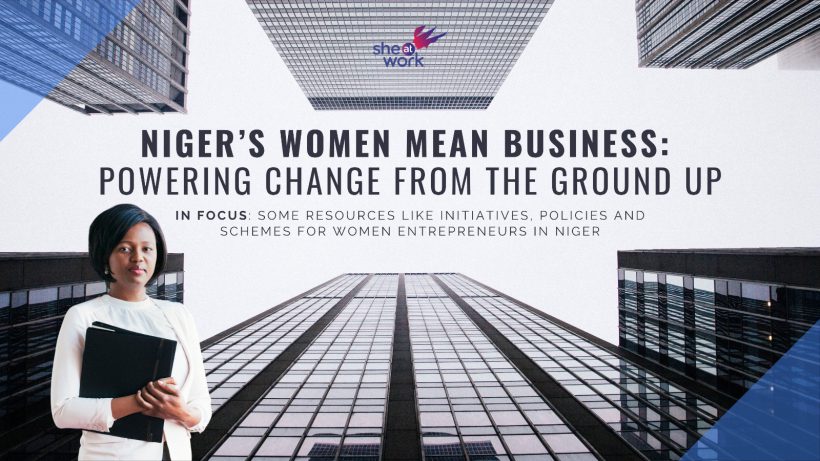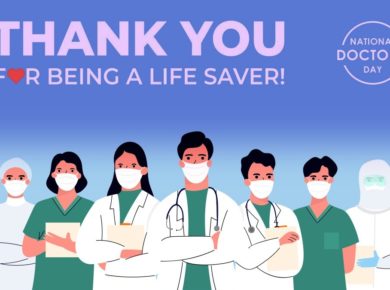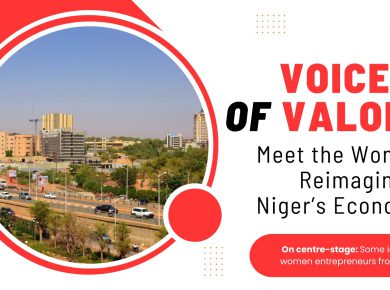In Focus: Some resources like initiatives, policies and schemes for women entrepreneurs in Niger
#WomenMeanBusiness #NigerRise #SheLeadsAfrica #EmpowerHerNow
In Niger State, women are quietly triggering a movement that holds the key to sustainable development & economic transformation. As more than half the population, women in this region are not just caregivers or agricultural laborers – they are entrepreneurs, innovators & community builders. Their ventures span everything – from local food production to fashion, crafts, and retail, each one contributing to job creation, poverty reduction, and family upliftment.
Yet, despite their undeniable impact, women entrepreneurs in Niger face entrenched barriers: limited access to credit, inadequate infrastructure & deep-rooted cultural norms that restrict mobility and opportunity. Formal financial institutions often overlook them, and many operate in the informal sector without the protections or benefits that formalization offers.
Empowered Women: A New Chapter in Entrepreneurship
Thankfully, change is underway. Programs like SAFEEM’s Women Entrepreneurship 4 Africa are providing investment readiness training, one-on-one mentorship & essential tools to help women scale their businesses. Financial support is growing through grants, loans & tax incentives, while capacity-building initiatives are opening doors through education and digital literacy. At the policy level, the Niger State government is beginning to recognize the importance of gender-inclusive development, rolling out supportive policies and local programs aimed at strengthening women-led businesses.
With the right mix of community support, targeted investment, and government action, the women of Niger State are poised not only to transform their own lives, but to reshape the entire economic landscape of the region. The time to invest in their potential is now.
Let us now, focus on some resources that are available for women entrepreneurs like – initiatives, policies and schemes.
- Bureau of African Affairs
What the Department of State’s Bureau of African Affairs is focused on is – the development & management of US policy concerning the African continent.
The Department’s Africa Strategy focuses on three core objectives:
1) Advancing trade and commercial ties with key African states to increase U.S. and African prosperity;
2) Protecting the United States from cross-border health and security threats; and
3) Supporting key African states’ progress toward stability, citizen-responsive governance, and self-reliance.
- The Secretary’s Office of Global Women’s Issues
Their mission is clearly spelt out. The Secretary’s Office of Global Women’s Issues (S/GWI) has a mandate to promote the rights and empowerment of women and girls through US foreign policy. Headed by an Ambassador-at-Large, the office leads the Department’s efforts to empower women and girls in U.S. diplomacy, partnerships, and programs.
https://www.state.gov/bureaus-offices/secretary-of-state/office-of-global-womens-issues
- Niger State Small, Medium Enterprises and Micro Finance Agency (NSSME&MFA)
Niger State Small, Medium Enterprises and Micro Finance Agency (NSSME&MFA) is a government agency set up – to promote and support the development of nano, micro, small and medium businesses in Niger State.
The objectives worked out are:
1. Provide training and capacity building for entrepreneurs.
2. Facilitate access to finance and credit facilities.
3. Enhance market access and linkages.
4. Promote entrepreneurship and innovation.
5. Create jobs and stimulate economic growth
Their vision is – to create a competitive SME sector that facilitate employment opportunities particularly in the area of agriculture, tourism and information communication technology.
At NIGER STATE SME AGENCY, they understand that running a business can come with its challenges, and seeking the right support can be a critical step. That’s why the focus of their team of dedicated professionals is – to provide expert guidance and tailored solutions your business deserves.
Their services include – Business Development Support, Funding and Grants Assistance, Entrepreneurship Training, Market Research and Strategy, SME Consulting Services & Sector-Specific Solutions.
- L’Oasis
Co-created by Empow’Her and Veolia – through its subsidiary SEEN (Société d’Exploitation des Eaux du Niger) – and with the support of the Veolia Foundation, L’Oasis in Niamey is inspired by La Recyclerie in Paris, a place in which Veolia has been the main partner since it opened in 2014.
In Niamey, the capital of Niger, L’Oasis is a spot for exchange and action – in sustainable development and women’s work in particular. This unique place focuses on enabling – entrepreneurial innovation, learning and awareness of the challenges presented by climate change.
L’Oasis promotes the integration of women in the economy through entrepreneurship – by strengthening their capacity to create businesses in the areas of the environment and maternal health. It also raises citizens’ awareness of sustainable development issues.
L’Oasis has been developed using eco-friendly methods. Designed by local entrepreneurs, including the artist Diassibo Tchiombiano and the “Young Volunteers for the Environment”, this 1,000 m2 incubator includes – training and collaborative work spaces (that can accommodate up to 40 entrepreneurs in residence), a projection room, library and an ecological kitchen garden to raise awareness about sustainable agriculture.
For Veoliait is also about being connected to an ecosystem of dynamic and committed actors in Niamey and having a place for meetings and exchanges with the local population, associations, institutions, and businesses. A concept that is at the centre of the company’s challenges – to meet the expectations of all its stakeholders.
Empow’her has been supporting women entrepreneurs around the world since 2011 – by co-creating training programs tailored to each local context. The organization works in France, Peru, Morocco, Senegal, Ivory Coast, Burkina Faso, Burma, Thailand, and Niger.
https://www.veolia.com/en/newsroom/news/entrepreneurship-women-oasis-niamey-niger
- Policies that empower women entrepreneurs in Niger
Five key political policies that could empower women entrepreneurs in Niger include:
1) Providing financial access and inclusion: This involves initiatives like microloans, government-backed lending programs, and access to digital financial services tailored to women’s needs.
In Niger, policies to support women entrepreneurs primarily focus on increasing access to finance, business skills development, and legal frameworks that protect women’s rights; and this includes initiatives like – microfinance programs, business mentorship, and ensuring equal access to resources and markets.
Many women entrepreneurs in Nigeria face challenges in accessing formal financial services due to lack of collateral, high interest rates, and limited access to information. Policies that promote financial inclusion, such as microfinance programs, government-backed lending schemes, and digital financial services, can help bridge this gap. Additionally, financial literacy programs can empower women to manage their finances effectively.
2) Enhancing infrastructure and business environment: This includes improving access to reliable electricity, water, roads, and security to reduce the cost of doing business, especially in rural areas.
A conducive business environment is crucial for the success of any entrepreneur, and women are often disproportionately affected by poor infrastructure. Investing in infrastructure like electricity, water, roads, and security can reduce the cost of doing business, make it easier for women to operate, and increase their productivity.
3) Supporting entrepreneurial skills and education: This could involve providing training programs, mentorship opportunities, and access to technology and information to help women entrepreneurs develop their businesses.
Many women entrepreneurs lack the skills and knowledge required to manage their businesses effectively. Providing access to training programs, mentorship opportunities, and information about relevant policies and regulations can empower them to grow their businesses. Furthermore, promoting education in STEM fields can help women develop the technical skills needed to compete in the modern economy.
4) Addressing gender-based discrimination and violence: This involves enacting and enforcing laws that protect women from discrimination and violence in the workplace and in business, and promoting a culture of respect for women in all areas of life.
Women entrepreneurs face significant barriers to success due to gender-based discrimination and violence. Enacting and enforcing laws that protect women from discrimination and violence in the workplace and in business can help create a more level playing field. Additionally, promoting a culture of respect for women in all areas of life can help to reduce the risk of harassment and discrimination.
5) Promoting inclusive business ecosystems: This involves encouraging cooperation between women entrepreneurs, providing platforms for networking and knowledge sharing, and supporting women-led business associations.
Women entrepreneurs can benefit from networking with other entrepreneurs, sharing knowledge, and learning from their experiences. Policies that promote cooperation between women entrepreneurs, provide platforms for networking and knowledge sharing, and support women-led business associations can help foster inclusive business ecosystems. Moreover, supporting women-led business associations can help them advocate for their needs and interests.
- Flourish Africa Grant
Programs like the Flourish Africa Grant mainly offer financial support to women entrepreneurs. These grants aim – to bridge the financing gap and empower women to scale their businesses.
The Flourish Africa Grant for Female Entrepreneurs, a ground-breaking initiative committed to the upliftment and empowerment of African women in business.
The main objective of this programme – is to provide comprehensive support to female-owned enterprises through a strategic blend of training, coaching, mentoring, and funding.
Flourish Africa is the women empowerment movement founded by Apostle Folorunso Alakija to serve as a catalyst for female empowerment and development.
Their mission is – to create a world where empowered women, empower other women. And they are on a mission – to provide like-minded and impact-driven women with a platform to collaborate, network and share knowledge.
https://www.flourishafrica.com/programmes/flourish-africa-grant
- Women Entrepreneurs Shark-Tank Program in Niger
The Public Diplomacy Section of US Embassy Niamey of the US Department of State announced an open competition – for organizations to submit applications to develop and implement a nationwide program to support women entrepreneurs.
This programme is designed to support women-owned businesses which often struggle to get access to capital, markets, and products and generally lack business training. The programme will provide training and mentorship to women business owners from all eight regions of Niger and will also include a local shark tank followed by a nationwide shark tank event where finalists from will pitch their business to the public and on television. The top two or three from each training site will compete in a nationwide event in Niamey.
- Women Entrepreneurs Finance Initiative (We-Fi)
The objective of We-Fi is – to address financial and non-financial constraints faced by women-owned/led small and medium enterprises (SMEs) in countries/territories that are eligible for financing from the International Development Association (IDA) and/or the International Bank for Reconstruction and Development (IBRD), provided they are also eligible for Official Development Assistance (ODA).
We-Fi aims to achieve its objectives – by using funding to mobilize billions of dollars in additional financing from commercial and international financial institutions (IFI) to provide women entrepreneurs with access to debt, equity, venture capital, insurance products, capacity building, networks and mentors, and opportunities to link with domestic and global markets; and for governments to improve the business environment for women-owned/led SMEs. We-Fi has a strategic goal of allocating 50 percent of its resources to activities in IDA countries and/or fragile and conflict affected countries/territories.
We-Fi welcomes proposals for global/regional, multi-country, and single country programs/projects.
- The African Women’s Entrepreneurship Program (AWEP)
The African Women’s Entrepreneurship Program (AWEP) is a women’s entrepreneurship initiative – that provides funding and capacity-building resources to African businesswomen to promote their participation in international trade.
The program was first established at the 2010 African Growth and Opportunity Act (AGOA) forum by the US Department of State, and it initially brought women entrepreneurs to the United States through the International Visitor’s Leadership Program (IVLP) for capacity building and professional development workshops.
The workshops provided information on a series of topics such as – U.S. business practices and access to U.S. markets under AGOA. Upon return to their respective countries, AWEP participants launched AWEP chapters in 44 African countries, many of which are still active today, and serve as business associations and networking hubs.
AWEP was relaunched in 2022 with new programmatic features during the United States-Africa Leaders’ Summit in Washington, DC. AWEP’s relaunch supports the expansion and export capability of women-led businesses in Africa by bolstering access to capital and markets and skills and capacity building.
The programme promotes women’s leadership throughout the continent. It focuses on connecting an inclusive membership and empowering AWEP women through local trainings and workshops in Africa. As part of a partnership between the US Department of State and the US African Development Foundation, AWEP also provides grants to established women-owned SMEs and works to connect African women entrepreneurs with American buyers and diaspora-owned businesses. These advancements equip African businesswomen with the tools and opportunities – to grow their businesses, serve as community leaders, and drive social and economic progress on the continent. AWEP’s relaunch empowers African women entrepreneurs on the ground to increase their participation in international trade.
https://www.state.gov/african-womens-entrepreneurship-program
https://www.state.gov/policy-issues/african-womens-entrepreneurship-program
Women Entrepreneurship for Africa (WE4A)
Increasing access to funding, market opportunities, knowledge enhancement, and technical training for women entrepreneurs in Africa – this programme is implemented by SAFEEM, a member of the Seedstars Group.
The Women Entrepreneurship for Africa (WE4A) project is an action jointly supported by the European Union (EU), the Organisation of African, Caribbean and Pacific States (OACPS) and the German Federal Ministry for Economic Cooperation and Development (BMZ), with implementation from the Tony Elumelu Foundation (TEF) and the German Development agency GIZ (E4D program). Running the growth and acceleration programs of WE4A is the Swiss Association for Entrepreneurship in Emerging Markets (SAFEEM).
The virtual Acceleration Program, implemented by SAFEEM, seeks to provide 100 female entrepreneurs from the TEF alumni network, with access to €10.000 in grant funding that will be paired with 3 months of technical support.
Seedstars Africa Ventures is an early-stage venture capital fund investing in high-growth companies active across Sub-Saharan Africa.
Early-stage entrepreneurs across the region are creating innovative online and offline models responding to critical products and service needs. They enjoy large market opportunities and boast high growth rates, and yet still have scarce access to capital and support compared to other regions of the globe.
Capitalizing on Seedstars’ pioneering presence in African entrepreneurship ecosystems since 2012, Seedstars Africa Ventures is profoundly an African investor bringing smart capital for entrepreneurs and providing them access to pan-African and international support.
https://safeem.org/women-entrepreneurship-4-africa
- African Union Development Agency- NEPAD (AUDA-NEPAD)
At the 31st Ordinary Session of the Assembly of African Union Heads of State and Government in Nouakchott, Mauritania, June 2018, a decision was taken to transform the NEPAD Planning and Coordination Agency into the African Union Development Agency-NEPAD (AUDA-NEPAD). The establishment of AUDA-NEPAD is part of the global reforms – geared at improving the Union’s impact and operational efficiency.
The mandate of AUDA-NEPAD is to:
a) Coordinate and Execute priority regional and continental projects to promote regional integration towards the accelerated realisation of Agenda 2063; and
b) Strengthen capacity of African Union Member States and regional bodies, advance knowledge-based advisory support, undertake the full range of resource mobilization and serve as the continent’s technical interface with all Africa’s development stakeholders and development partners.
The new AUDA-NEPAD mandate gives the organization a wider role in terms of providing knowledge-based advisory support to AU Member States in the pursuit of their national development priorities.
The core functions of the Agency are to:
- Incubate innovative programmes in various fields, including technology, research and development, knowledge management, and data analytics;
- Provide technical and implementation support to RECs and Member States in the development and execution of priority projects and programmes;
- Assist Member States and RECs to strengthen capacity in key areas such as food and nutrition, energy, water, infrastructure, information and communication technology and digital economy, natural resource governance, climate change and institutional and human capital development and innovation;
- Provide advisory support in the setting up and application of norms and standards in thematic priorities of the AU to accelerate regional integration;
- Provide technical backstopping to the AU in implementing policy recommendations at the continental, regional and national levels;
- Monitor and assess Africa’s development trends and progress with the view to achieve key continental and global goals for the purpose of technical reporting;
- Undertake, apply and disseminate research on policy development support for Member States;
- Coordinate, facilitate and promote cooperation with Africa’s strategic partners and stakeholders for effective resource mobilization;
- Coordinate and facilitate partnership with stakeholders and African academia;
- Foster the cooperation in Africa with the private sector; and
- Coordinate between AU Specialized Agencies, Organs and other institutions to create an enabling and supportive environment for the achievement of the goals and priorities of Agenda 2063.
· Niger is among the countries that endorsed the continent’s first Model Law on Medical Products Regulation in January 2016 to improve access to quality and safe drugs as well as fight the circulation of fake medical products on the continent.
· Niger is among the African countries that are promoting Decent Rural Youth Employment and Entrepreneurship as a result of participation in the Inaugural Africa Rural Development Forum held in May, 2013 in Cotonou.
· A total of 775,000 women have benefited from six projects implemented by the NEPAD Spanish Fund for the Empowerment for African Women in Niger.
· Niger is working towards increasing its renewable energy generation capacity through involvement in the Solar – Desertec Sahara Solar Project which promotes the generation of electricity in North Africa, the Middle East and Europe using renewable sources, such as solar power plants and wind parks.
· The Country is benefiting from the Trans Sahara Highway project through the construction of a 225-km-long missing link from Assamakka to Arlit, Niger at a cost of USD102 million.
· The 4,500km optic fibre line from Algeria to Nigeria also includes Niger and resources have been provided by the African Development Bank (AfDB) for feasibility studies for the Niger and Chad segment.
· Niger is also a beneficiary of the Dakar-Niamey Multimodal Corridor programme which is designed to modernise the most heavily travelled ARTIN corridor in West Africa and facilitate trade, OSBPs and PPPs.
· 85 Million hectares of land on the continent have been committed for restoration through the application of the restoration opportunities assessment methodology. To date, Niger has committed 3.2 million hectares.
· Niger is increasing access to financial instruments such as insurance associated with credit, productive safety nets, access to markets, storage facilities and improved producer remuneration through market reform and strengthening of cooperatives and producers’ associations.
· Niger also received USD33 million from the Global Agriculture and Food Security Programme (GAFSP) to contribute to poverty alleviation by boosting rural production and enhancing food security in vulnerable areas.
https://www.nepad.org/countries/niger
- The African Development Foundation
This US government agency offers grants specifically aimed at supporting African entrepreneurs, with a strong emphasis on women-led businesses that contribute to community development.










